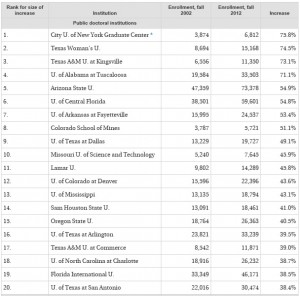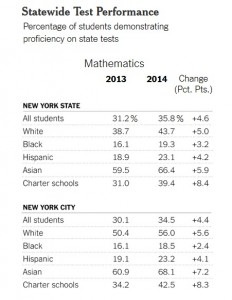Dear Commons Community,
In what has to be one of the greatest conversion stories since St. Paul on his way to Damascus, Arne Duncan announced on his blog yesterday a new USDOE stance on standardized testing. Here are excerpts from his posting:
“There are three main issues I’ve heard about repeatedly from educators:
- It doesn’t make sense to hold them accountable during this transition year for results on the new assessments – a test many of them have not seen before – and as many are coming up to speed with new standards.
- The standardized tests they have today focus too much on basic skills, not enough on critical thinking and deeper learning.
- Testing – and test preparation – takes up too much time.
I share these concerns. And I want our department to be part of the solution.
To those who are reading the last sentence with surprise, let me be clear: assessment is a vital part of teaching and learning, but it should be one part (and only one part) of how adults hold themselves responsible for students’ progress. Schools, teachers and families need and deserve clear, useful information about how their students are progressing…
But assessment needs to be done wisely. No school or teacher should look bad because they took on kids with greater challenges. Growth is what matters. No teacher or school should be judged on any one test, or tests alone – always on a mix of measures – which could range from classroom observations to family engagement indicators…
But the larger issue is, testing should never be the main focus of our schools. Educators work all day to inspire, to intrigue, to know their students – not just in a few subjects, and not just in “academic” areas. There’s a whole world of skills that tests can never touch that are vital to students’ success. No test will ever measure what a student is, or can be. It’s simply one measure of one kind of progress. Yet in too many places, testing itself has become a distraction from the work it is meant to support.
I believe testing issues today are sucking the oxygen out of the room in a lot of schools – oxygen that is needed for a healthy transition to higher standards, improved systems for data, better aligned assessments, teacher professional development, evaluation and support, and more. This is one of the biggest changes education in this country has ever seen, and teachers who’ve worked through it have told me it’s allowed them to become the best teachers they’ve ever been. That change needs educators’ full attention.
That’s why – as I shared in a conversation with dozens of teachers at Jefferson Middle School in Washington, D.C. earlier today – we will be taking action in the coming weeks that give states more flexibility in key areas that teachers have said are causing worry.
States will have the opportunity to request a delay in when test results matter for teacher evaluation during this transition. As we always have, we’ll work with them in a spirit of flexibility to develop a plan that works, but typically I’d expect this to mean that states that request this delay will push back by one year (to 2015-16) the time when student growth measures based on new state assessments become part of their evaluation systems – and we will work with states seeking other areas of flexibility as well…
I’m concerned, too, when I see places where adults are gaming tests, rather than using them to help students.
And we also need to recognize that in many places, the sheer quantity of testing – and test prep – has become an issue. In some schools and districts, over time tests have simply been layered on top of one another, without a clear sense of strategy or direction. Where tests are redundant, or not sufficiently helpful for instruction, they cost precious time that teachers and kids can’t afford. Too much testing can rob school buildings of joy, and cause unnecessary stress. This issue is a priority for us, and we’ll continue to work throughout the fall on efforts to cut back on over-testing.
There’s plenty of responsibility to share on these challenges, and a fair chunk of that sits with me and my department.”
Alleluia! Alleluia! Alleluia!
Dare I say that it remains to be seen whether Duncan and his USDOE staff of corporate and private foundation allies have really seen the light.
Tony








